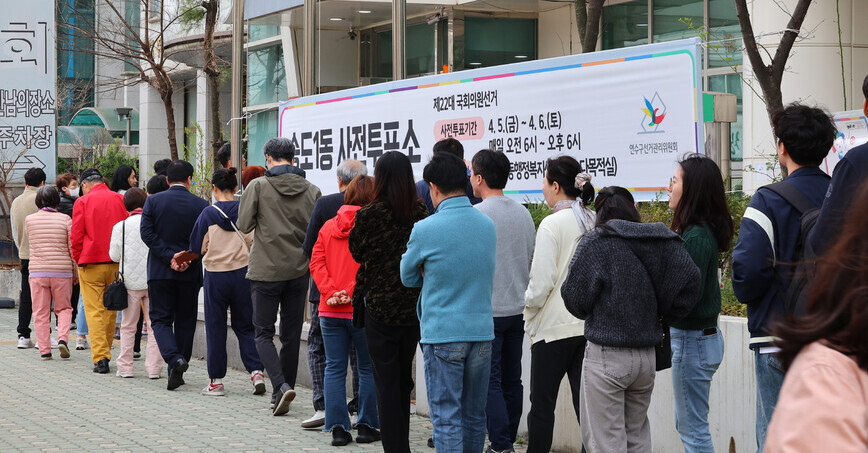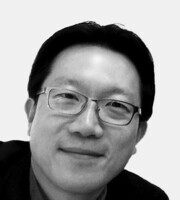hankyoreh
Links to other country sites 다른 나라 사이트 링크
[Column] In Korea’s midterm elections, it’s time for accountability


By Shin Jin-wook, professor of sociology at Chung-Ang University
“Accountability” is a term used by scholars to refer to the issue of how to ensure that a government performs its proper role in a democracy.
The core of the concept lies less in “responsibility” per se than in the need for mechanisms for demanding explanations when there are problems with an administration’s actions and policies, and for punishing missteps.
Administrations are held to account by legislatures and courts, but accountability is primarily achieved by the choices and punishments made by voters in elections. What are South Koreans demanding accountability for in this latest election?
The election seems to have turned into a battle between privileged segments of the ruling and opposition parties, which have been slinging mud at each other without actually competing over policies or offering a vision for the future. A look at the behavior of politicians shows this assessment to be apt.
But if that were all there was to it, “disillusionment” should have ended up being a key theme of the election. The reality has been the opposite.
Opinion polls conducted on the eve of voting showed lower rates of respondents identifying as “independent” than in the 20th or 21st National Assembly elections, while the country sees the highest early voting turnout rates in its history. Understanding this larger trend in public sentiment is crucially important for us to grasp the significance of the election.
Various currents have been observed in public opinion, but if there is one theme that has been most pronounced in the election to date, it is the feeling that the Yoon Suk-yeol administration needs to be held to account.
Apart from a few temporary exceptions, support for “reining in” the administration has tended to run 5 to 10 percentage points higher than opinion backing the administration. Despite Yoon’s efforts in touring South Korea to pledge support, the rate of negative opinion on his job performance has reached around 60%.
Whatever people may think of the Rebuilding Korea Party, the attention it has drummed up with its slogan of “three years is too long a time” — a reference to how many years Yoon has left in office — has been one of the most striking developments of the election.
The impassioned calls for “passing judgment” show how frustrated people are feeling with South Korean politics’ inability to move forward into the future. But to view those emotions as “revenge” or “politics of hate” is all too superficial an analysis.
The reason many South Koreans seem to be prioritizing the need to pass judgment on the Yoon administration — in spite of the many faults of the opposition parties — seems to stem from an urgent sense of the need to stop incompetent officials from running rampant. People appear to want to tear down the walls so that change can finally happen.
So the key issue is not the “judgment” in and of itself — it has to do with what the public wants to pass judgment on and why.
An analysis of regular Gallup Korea survey findings over the past several months shows three major factors that have consistently topped the list of reasons people negatively rated the president’s job performance.
One has to do with matters of the economy, livelihoods and prices, while the others concern perceptions of the administration as “high-handed” and “one-sided” and issues relating to the actions of first lady Kim Keon-hee.
The high rates of response that these seemingly dry survey items have drawn attest to the public’s feelings of hope and despair regarding the political chains that are holding South Korean society back and the historical tasks that need to be accomplished.
First among those tasks is effecting institutional reforms to guarantee social security and alter an economic reality that operates at the expense of workers and ordinary people. Second is establishing the kind of democracy that guarantees civic and press freedoms while preventing the abuse of authority by the state and politicians.
Third is establishing a genuine rule of law and breaking apart power structures so that the law cannot be used as a weapon to bind the public and shield the administration.
As this shows, South Korea today has not yet realized the basic values of modernity in terms of achieving a welfare state, democratic state, and the rule of law. This objective stagnation in historical development is holding back the advancement of politics.
The reason South Korea as a society is failing to meet the contemporary challenges of an aging society, the climate crisis, and a changing international environment is not simply that people’s “ideas” are stuck back in the old days. The problem is a reality where we’ve either failed to make progress or actually regressed on the basic, time-honored issues, so that the old oppositions just keep resurfacing.
When political energies are committed to overcoming these historical barriers, that’s when the space opens up for expanding many other issues on the contemporary agenda.
Throughout South Korea’s modern history, the passing of political judgment and the reaffirmation of citizen sovereignty have served as catalysts for various forms of social progress. The April revolution of 1960 was followed by calls for inter-Korean peace, the June Democratic Struggle of 1987 by a major struggle for worker rights, and the candlelight demonstrations of 2008 by the creation of various communities of everyday democracy.
Such positive changes are not guaranteed to follow when the opposition wins a general election. But if the Yoon administration finds itself running into its limits with this election, South Korean politics will enter a process of dynamic restructuring.
When walls have been put up to prevent anything from flowing, nothing ends up happening. When those walls start to crack, the water comes pouring out by itself.
We have no way of knowing in what direction the water will flow. But even if the future is uncertain, it’s better to live in a world where we’re fighting for an uncertain future than in one where we succumb to cynicism and lethargy.
The time for accountability has come — and after that, a time for change will follow.
Please direct questions or comments to [english@hani.co.kr]

Editorial・opinion
![[Column] Season 2 of special prosecutor probe may be coming to Korea soon [Column] Season 2 of special prosecutor probe may be coming to Korea soon](https://flexible.img.hani.co.kr/flexible/normal/500/300/imgdb/original/2024/0426/3317141030699447.jpg) [Column] Season 2 of special prosecutor probe may be coming to Korea soon
[Column] Season 2 of special prosecutor probe may be coming to Korea soon![[Column] Park Geun-hye déjà vu in Yoon Suk-yeol [Column] Park Geun-hye déjà vu in Yoon Suk-yeol](https://flexible.img.hani.co.kr/flexible/normal/500/300/imgdb/original/2024/0424/651713945113788.jpg) [Column] Park Geun-hye déjà vu in Yoon Suk-yeol
[Column] Park Geun-hye déjà vu in Yoon Suk-yeol- [Editorial] New weight of N. Korea’s nuclear threats makes dialogue all the more urgent
- [Guest essay] The real reason Korea’s new right wants to dub Rhee a founding father
- [Column] ‘Choson’: Is it time we start referring to N. Korea in its own terms?
- [Editorial] Japan’s rewriting of history with Korea has gone too far
- [Column] The president’s questionable capacity for dialogue
- [Column] Are chaebol firms just pizza pies for families to divvy up as they please?
- [Column] Has Korea, too, crossed the Rubicon on China?
- [Correspondent’s column] In Japan’s alliance with US, echoes of its past alliances with UK
Most viewed articles
- 1‘We must say no’: Seoul defense chief on Korean, USFK involvement in hypothetical Taiwan crisis
- 2Why Kim Jong-un is scrapping the term ‘Day of the Sun’ and toning down fanfare for predecessors
- 3Two factors that’ll decide if Korea’s economy keeps on its upward trend
- 4BTS says it wants to continue to “speak out against anti-Asian hate”
- 5After election rout, Yoon’s left with 3 choices for dealing with the opposition
- 6Gangnam murderer says he killed “because women have always ignored me”
- 7South Korea officially an aged society just 17 years after becoming aging society
- 8AI is catching up with humans at a ‘shocking’ rate
- 9Ethnic Koreans in Japan's Utoro village wait for Seoul's help
- 1046% of cases of violence against women in Korea perpetrated by intimate partner, study finds